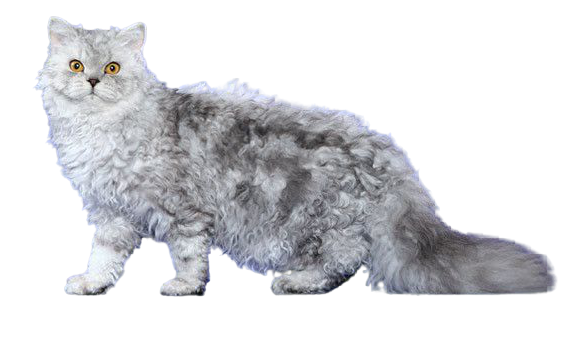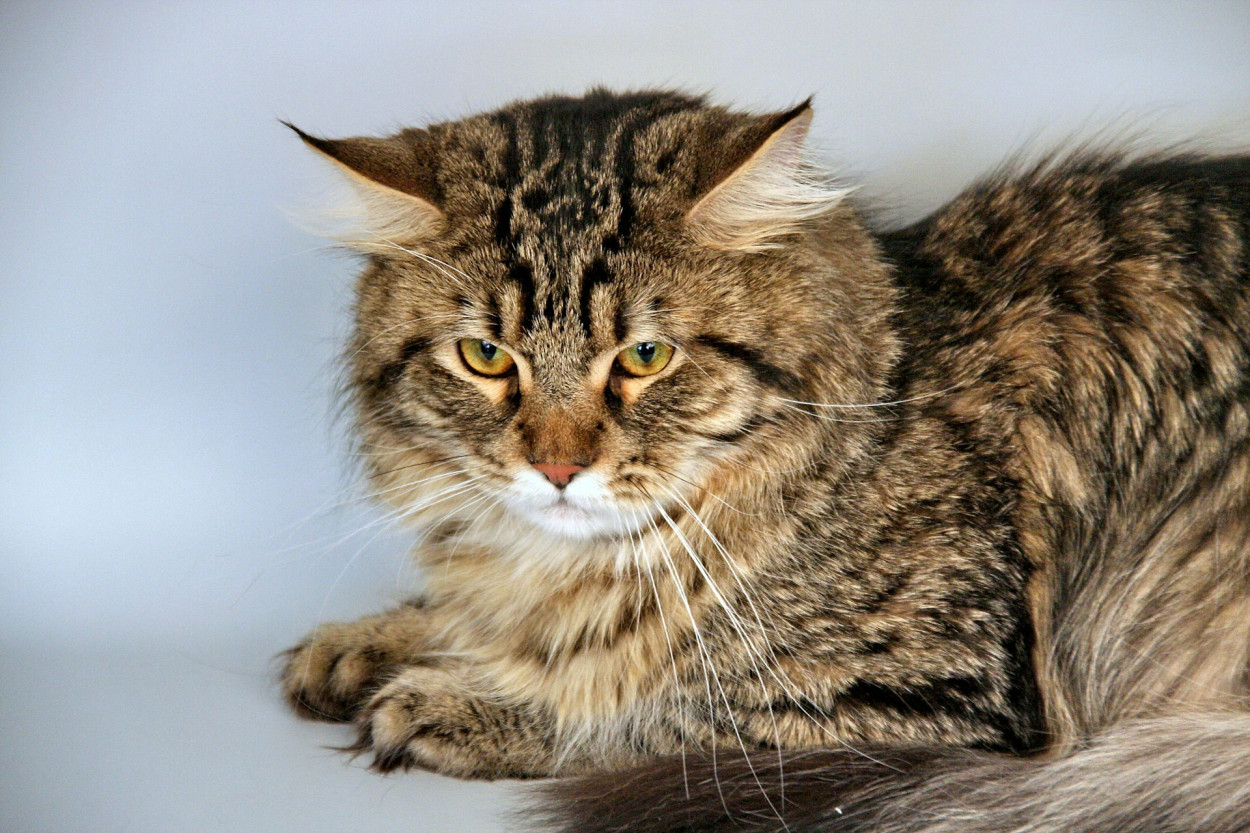
Selkirk Rex
USD $800 - $1500 Price Avg.
Medium, Large
Size
Yes
Lap Cat
14 to 15 years
Lifespan
Breed Information
| Popularity/Rank | 22 |
|---|---|
| Name | Selkirk Rex |
| Other names | Shepherd Cat |
| Origin | United States |
| Size | Medium, Large |
| Coat | Curly, Dense, Plush, Short, Long |
| Lap Cat | Yes |
| Lifespan | 14 to 15 years |
| Temperament |
Affectionate, Dependent, Gentle, Patient, Playful, Quiet, Social, Active 1. Affectionate: The Selkirk Rex is an affectionate cat breed that loves to cuddle and be around their humans. They are known for being gentle and patient, making them great companions for families with children or other pets. While they do enjoy playing, they are generally quiet cats that won't disturb your peace and quiet. |
| Weight | Female: 6 - 12 pounds, Male: 11 - 16 pounds |
| Colors | Black, Chocolate, Cream, Lavender, Red, White |
| Kitten Prices |
USD $800 - $1500
The Selkirk Rex is a relatively new breed of cat that was only developed in the late 20th century. This breed is characterized by its curly, wooly coat which can come in a variety of colors and patterns. Selkirk Rex kittens are typically priced between $800 and $1500, although this price can vary depending on the breeder or the kitten's parents. While the Selkirk Rex is not the most expensive breed of cat, it is still relatively pricey. This high price tag is due to several factors, including the rarity of the breed and the amount of time and effort required to care for their coats. Additionally, Selkirk Rex kittens are often sold with a higher price tag than other breeds due to their unique appearance and desirable coat texture. While the cost of a Selkirk Rex kitten may be high, there are several benefits to owning one of these cats. Selkirk Rexes are known for being intelligent, affectionate, and good-natured cats that make great companions. Additionally, their curly coats require less grooming than other long-haired breeds, making them low-maintenance pets. Overall, Selkirk Rexes make excellent pets for those who are willing to pay their higher than average price tag. |
Breed Characteristics
| Adaptability | |
|---|---|
| Affection Level | |
| Child Friendly | |
| Dog Friendly | |
| Energy Level | |
| Grooming | |
| Health Issues |
Hair loss, dandruff, itchy skin, allergies, respiratory problems, digestive issues. Is Selkirk Rex cat Hypoallergenic? There is no definitive answer to this question as each individual reacts differently to different animals. However, the Selkirk Rex cat is considered to be hypoallergenic as it produces less of the protein that is responsible for triggering allergies in people. This makes them a good choice for those who are looking for a hypoallergenic pet. 1. Hair Loss The Selkirk Rex cat breed is prone to hair loss. This can be caused by a number of factors, including stress, poor nutrition, and allergies. If your Selkirk Rex is losing hair, it is important to take them to the vet to rule out any underlying health problems. There are a number of treatments that can help to reduce hair loss in Selkirk Rex cats, including medicated shampoos and dietary supplements. 2. Dandruff Dandruff is another common issue in Selkirk Rex cats. This is usually caused by dry skin, and can be made worse by allergies or poor grooming habits. If your Selkirk Rex has dandruff, you should try using a medicated shampoo to help clear up the problem. You may also want to consider changing their diet to include more fatty acids, which can help to improve skin health. 3. Itchy Skin Itchy skin is another common problem in Selkirk Rex cats. This can be caused by a number of things, including allergies, parasites, and dry skin. If your Selkirk Rex is scratching excessively, it is important to take them to the vet to rule out any underlying health problems. There are a number of treatments that can help to relieve itchiness, including medicated shampoos and anti-allergy medications. 4. Allergies Allergies are a common problem in Selkirk Rex cats. Allergies can be caused by a number of things, including food, pollen, and dust. If your Selkirk Rex has allergies, it is important to take them to the vet to get a diagnosis. There are a number of treatments that can help to relieve allergy symptoms, including anti-allergy medications and allergy shots. 5. Respiratory Problems Respiratory problems are relatively common in Selkirk Rex cats. This is usually due to the fact that they have a short nose, which can make it difficult for them to breathe. If your Selkirk Rex is having difficulty breathing, it is important to take them to the vet to get a diagnosis. There are a number of treatments that can help to improve respiratory function, including medication and surgery. 6. Digestive Issues Digestive issues are relatively common in Selkirk Rex cats. This is usually due to the fact that they have a short digestive tract, which can make it difficult for them to digest food properly. If your Selkirk Rex is having digestive problems, it is important to take them to the vet to get a diagnosis. There are a number of treatments that can help to improve digestive function, including medication and surgery. |
| Intelligence | |
| Shedding | |
| Social Needs | |
| Stranger Friendly | |
| Vocalization | |
| Health Care |
The Selkirk Rex is a relatively new breed of cat, having only been around since 1987. As such, not much is known about their long-term health. However, they are generally a healthy breed with no known major health concerns.
As with all cats, good Selkirk Rex health care starts with regular vet check-ups and vaccinations. They should also be spayed or neutered to help prevent health problems later in life. A healthy diet and plenty of exercise are also important for keeping your Selkirk Rex in tip-top shape. While there are no known major health concerns specific to the Selkirk Rex breed, they are prone to the same health problems as any other cat. These include things like obesity, dental problems, and respiratory infections. So, it's important to be aware of these potential health issues and to take steps to prevent them. Overall, the Selkirk Rex is a healthy breed of cat. However, as with all cats, they do require some basic health care to stay in good shape. Regular vet check-ups, vaccinations, and a healthy diet are all important for keeping your Selkirk Rex happy and healthy. |
History
The Selkirk Rex is a breed of cat that was developed in the 1980s. The breed is named after its place of origin, the city of Selkirk in Scotland. The Selkirk Rex is a cross between a domestic shorthair and a Persian.
The history of the Selkirk Rex cat began in 1987 when a black and white kitten named Miss DePesto was born in a litter of six kittens. Miss DePesto had curly fur, which was different from the straight fur of her littermates. Her owner, Jeri Newman, decided to keep her and see if her fur remained curly as she grew older.
Newman showed Miss DePesto to various cat fanciers and breeders to see if anyone knew of any other cats with similar fur. Curly-furred cats had been seen before, but they were not considered to be a separate breed. Newman began breeding Miss DePesto with other cats that had curly fur, and eventually developed the Selkirk Rex breed.
The Selkirk Rex almost became extinct in the early 2000s due to lack of interest from breeders. However, the breed has since become popular again and is now recognized by major cat registries such as the Cat Fanciers Association (CFA) and The International Cat Association (TICA).
The ancestry of the Selkirk Rex includes both short-haired and long-haired cats. The most common ancestors are British Shorthairs and Persians, but other breeds such as Siamese, Maine Coons, and Exotics have also been used in its development.
The Selkirk Rex is recognized as a separate breed by major cat registries such as the CFA and TICA. It is also recognized by the World Cat Federation (WCF) and the American Cat Fanciers Association (ACFA).
Description
The Selkirk Rex is a cat breed that is known for its curly coat. The coat can be either short or long, and it is available in a variety of colors. The Selkirk Rex is a medium-sized cat, and it typically weighs between 8 and 10 pounds. The lifespan of a Selkirk Rex is typically between 12 and 15 years.
The Selkirk Rex is a friendly and outgoing cat, and it gets along well with other cats, dogs, and children. The Selkirk Rex has a laid-back personality, and it is not prone to excessive vocalization or aggression. The health of Selkirk Rex cats is generally good, although they are susceptible to some health conditions such as obesity and hip dysplasia.
The Selkirk Rex is an adaptable cat, and it does well in both indoor and outdoor environments. The benefits of owning a Selkirk Rex include its friendly personality, low maintenance coat, and good health.




